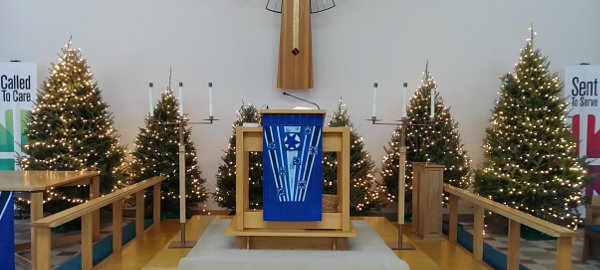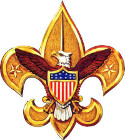Scoutmaster Musings
Archives:
2025 2023 2022 2021 2020 2019
2018 - Dec Nov Oct Sep Jul Jun May Apr Jan
2017 2016 2015 2014 2013 2012 2011 2010 2009 2008 2007 2006 2005

Lack of adequate Personal and Camp hygiene is a common problem on outings, and something that is easy to prevent. With a little education and effort, no one should get sick when out in the wilds.
First, a few common problems encountered by long-distance hikers on the Appalachian Trail:
- Sharing Food - once someone touches their food, it is contaminated with their germs. If you finish off someone else's extra tater tots, oreos, or whatever, you ingest their germs. Only take what you will eat, and eat what you take.
- Not Washing Hands - dirt on your hands is easy to see and easy to wash off with just water. Rather than the visible dirt, it's the invisible germs, filth, and human waste that cause more problems. Even when hands look clean, you really should wash after using the bathroom and before dealing with any food. This is considered by many as the most common cause of illness in the outdoors.
- Sleeping in Close Quarters - sickness you have growing inside you can spread through the air from exhaling, sneezing, or coughing. When many people are packed in a small space, such as a shelter, tent, or cabin, they all breathe much of the same air. Two-person tents, or open-air sleeping, reduces the confinement problem.
- Insect-borne Disease - in North America, mosquitoes are spreading diseases such as West Nile and Zika, but they are still relatively rare. Lyme disease from ticks is much more common, and spreading. Treating clothes, checking for ticks often, and using insect repellant or bug clothes greatly reduce the chance of contracting these diseases.
- Water-borne Disease - everyone drinks treated water from the faucet at home, and they know wild water can be contaminated. Knowing the proper way to use a treatment method, and performing the task correctly, is the simple way to stay safe. Skipping treatment "just this once", dropping a filter in the water, not waiting for chemicals, or any number of other excuses cause much discomfort on the trail.

A key area of camp hygiene that scout groups tend to perform regularly is the washing of dishes and cooking equipment. Even though it is done every meal, people still get sick because there is some hard-to-stop misinformation about the proper way to wash dishes at camp. If there is one helpful thing you can do for your scout group, it is to teach, promote, and check on proper dishwashing technique.
- Pre-wash - eat, lick, and scrape off all visible food bits. When dishes get to the next step, they should already look fairly clean.
- Wash - a bucket of hot water and soap to scrub everything off the dishes. Shake all the water off before passing to next step.
- Rinse - a bucket of hot water to rinse off anything lingering behind, like soap.
- Sanitize - a pot of cool water containing chlorine or iodine. Soak for 30 seconds. Chlorine can be a shorter time, but it won't hurt to be longer.
- Air Dry - set dishes upside down on a towel or clean surface to drip dry for 30 minutes or more. Wiping dry with a common towel will spread germs from one dish to the next.
The common misinformation is switching the Sanitize and Rinse pots, or using hot water in the Sanitize pot. It doesn't make sense to rinse after sanitizing, just let the dishes air dry. Using hot water with the sanitizing chemicals makes them less effective.
This proper way to wash dishes is not something I made up. The CDC, ServSafe, every state health department, and Canada recommend the same process.

A few other tips for dishwashing:
- Wash cleanest things first, such as glasses and utensils, working your way to the dirtiest last which are probably the cooking pots.
- To dispose of the wash water, use a screen strainer to catch bits. Strain pot #1. Pour pot #2 into #1 and strain again. Pour pot #3 into #2, then into #1, and strain again. This gets your pots clean, too.
- Dispose of wash water into a sump, or broadcast it away from camp - depending on your camping location.
- Dishwashers should wash their hands well after doing the dishes.
The BSA has created a Dishwashing video - pretty lame, but has the right steps.
So, do your scouts a favor and share proper dish washing techniques to keep everyone happy, healthy, and hungry.
Scout On
| See 1 comment | Leave Comment |
This is a sponsored post written by me on behalf of The Nature Conservancy. All opinions are 100% mine.

The holidays can become times of excess - so many big meals, so many parties, so many presents to buy, and not enough time to put up decorations, hit the sales, or attend the plays and productions. While putting in all the effort to make the holidays fun for all, it's easy to overlook the long-term environmental damage we may do. As Scouts, we should take the time to look and try to minimize our impact.
Last week, I helped our pastor pick out and set up six Christmas trees in our sanctuary. Those trees were harvested from a commercial forest where they had been absorbing carbon dioxide, storing carbon, and putting out oxygen for years, as well as providing cover for wildlife. In the empty spots where they stood, new trees are being planted. Many BSA troops sell trees as a fundraiser. We got the trees for church from a local BSA troop that uses the church as their tree lot. After Christmas, our city recycles trees left by the curb, but I do know scouts across the country pick them up and recycle them as a fundraising service.
Other troops sell wreaths. We've bought a wreath every year and I dismantle them when they're no longer needed in January. I compost the greens, recycle the metal, and re-purpose the pair of pine cones that come on each one. We've now got a couple of pine cone trees that help decorate outside our home, and another gradually being made.

A big part of Scouting is getting out in nature, learning about it, enjoying it, and conserving it. My two Eagle Scout sons and I have enjoyed literally hundreds of days and nights in the great outdoors and we do try to ensure it will be available for future scouts. There are many other organizations besides the BSA that work to protect our world, sometimes doing a better job than us. The Nature Conservancy, for example, has priorities that align with Scouting.
The Nature Conservancy has been helping keep spaces natural for over 65 years and has a mission to "conserve the lands and waters on which all life depends". They've protected well over 100,000,000 acres of land. Taking a bit from the Outdoor Code, they want to help us be more conservation-minded this year, and have created a useful Holiday Green Guide with good ideas to consider. Download the guide by entering your name and email to find out the best way to be a little greener this holiday season. By reading the guide and keeping the handful of easy tips in mind, you can have a happy holiday and help the earth.
One of their tips is to use natural decorations when possible. Another is to help you with gift ideas. Buying presents just because it's time to buy presents can result in piles of "stuff" that doesn't get used and eventually gets donated or thrown away. Certainly give gifts, but be sure they are wanted. For those people like me that no longer have a Christmas list, giving a unique and interesting Symbolic Gift can be a good option. Symbolic gifts are typically monetary donations to an organization that the recipient supports, and the recipient receives some small item explaining what was given in their name. For example, through The Nature Conservancy, you can donate and have the recipient receive a certificate and bookmark about bison, orangutan, sea turtle, or other wildlife that the gift helps to protect.
My wife and I have been giving symbolic gifts for years and this year we've asked our two sons to try it for gifts to us. Find out more about having a greener holiday by downloading the Holiday Green Guide - it will at least give you a few interesting topics to keep the conversations going at all those parties in the next few weeks.
Scout On!
| Leave Comment |
Comments:
Feb 25, 2023 - Joe Patterson
Mar 16, 2023 - Adam John
Jan 21, 2024 - Johnna Downing
Scouting 2025 - Ask a Question - Add Content
Just for Fun: Socializing merit badge




Find more Scouting Resources at www.BoyScoutTrail.com



Follow Me, Scouts
Recent Comments